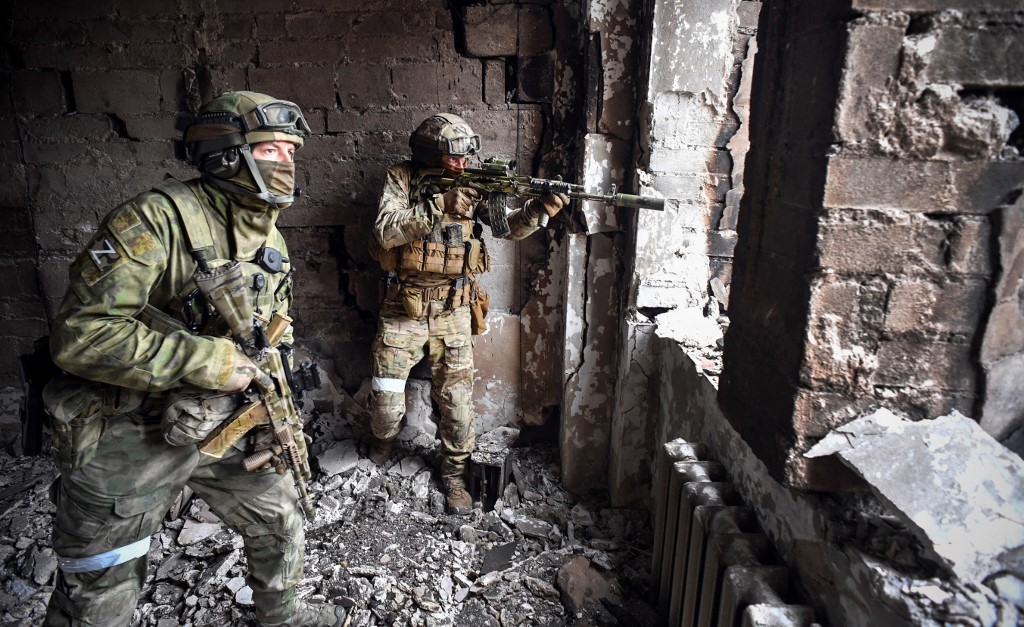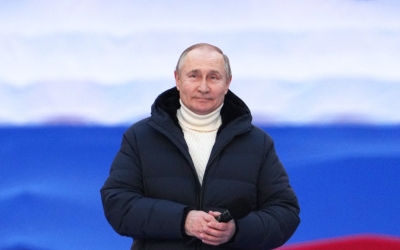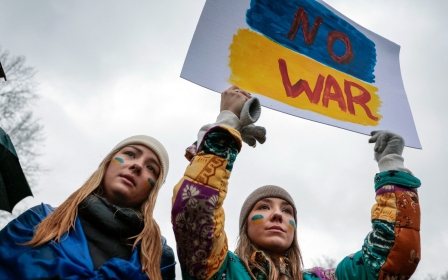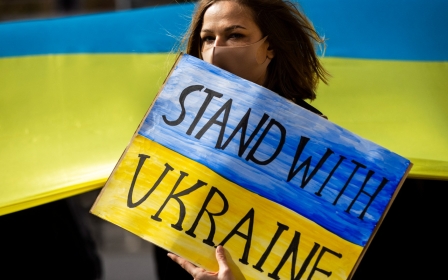The Russia-Ukraine war and the crisis of liberalism
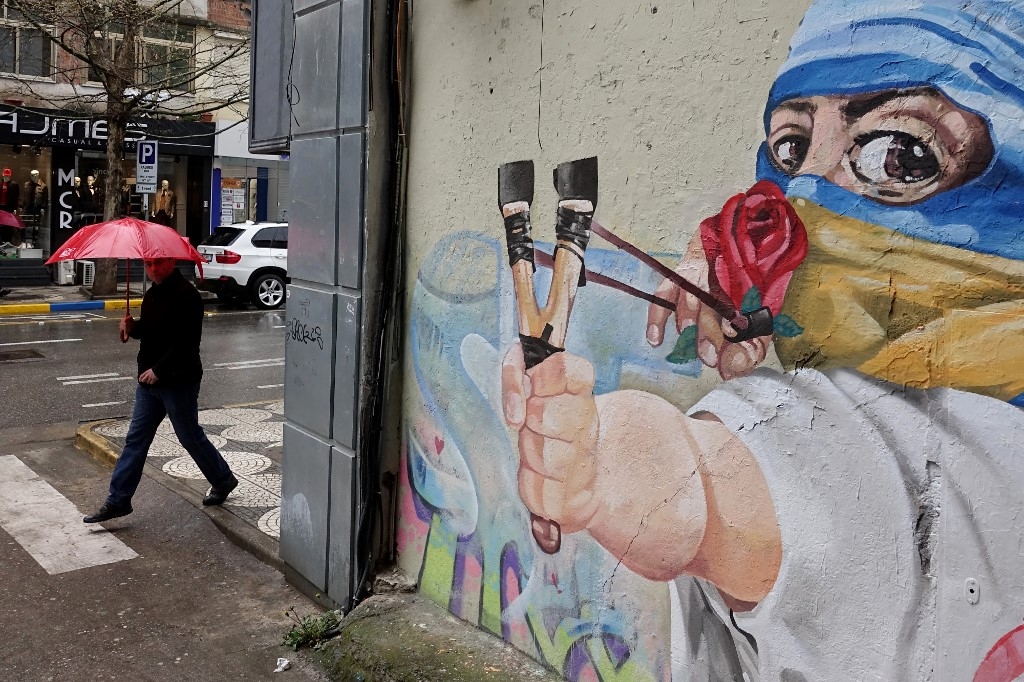
While ordinary Ukrainian men and women pick up arms to defend their homeland in the trenches, audiences in the US and Europe sit in the comfort of their homes, glued to their screens and stunned by the resilience with which people on the eastern flank of Europe are resisting the encroachment of authoritarianism.
The struggle of Ukrainians against Russian aggression shows the West that the liberal order can be defended. But for this to truly happen, the liberal momentum must extend far beyond the focus on eastern Europe.
Not only is the war in Ukraine a pivotal moment in redefining Europe’s geo-strategic raison d’etre, but it is also a potential turning point
Today, the liberal order is not being defended by the self-styled “old liberal bastions” of the US and western Europe, whose passive complacency towards creeping authoritarianism worldwide only fuelled Russian President Vladimir Putin’s hubris.
Instead, it is Ukrainians who have mobilised, not just to avert Russian aggression but to fight for liberal self-determination and freedom from repression.
Not only is the war in Ukraine a pivotal moment in redefining Europe’s geostrategic raison d’etre, but it is also a potential turning point, showcasing the limitations of the authoritarian resurgence witnessed in the 2000s.
New MEE newsletter: Jerusalem Dispatch
Sign up to get the latest insights and analysis on Israel-Palestine, alongside Turkey Unpacked and other MEE newsletters
In 1989, American political scientist Francis Fukuyama wrote famously about the end of history, suggesting that with the collapse of Soviet-style communism, humanity had reached “the end-point of mankind’s ideological evolution and the universalization of Western liberal democracy as the final form of human government”.
In recent years, this thesis has widely been countered. US President Joe Biden spoke of a liberal order in crisis during his inaugural address. Putin in 2019 even went as far as to state that the liberal ideology that underpins western democracy had “outlived its purpose”.
Crisis of liberalism
The crisis of liberalism is real - both at home in the US and Europe, as well as overseas. The liberal grand strategic narrative of the universality of human rights and civil liberties lost its appeal amid the widening of the say-do gap between what liberalism promises and what it actually delivers.
The liberal grand strategic narrative of the universality of human rights lost its appeal amid the widening of the say-do gap between what liberalism promises and what it actually delivers
The “war on terror” provided a pretext for liberals to undermine liberal rights and norms in the name of security, both domestically and overseas. The Iraq War, launched in 2003, first saw the exploitation of liberalism to justify an unjust war, before triggering the withdrawal of western leadership from the region and surrendering the Middle East to authoritarian self-determination.
The Arab Spring presented an opportunity for the West to rebuild the appeal of the liberal narrative, demonstrating that the US and Europe would stand firmly with revolutionaries fighting for liberal self-determination and against authoritarian repression.
Yet, untouched by the fate of those desperately butchered by repressive regimes, the bastions of liberalism stood idly on the sidelines, watching first the revolutionaries fail and then the counterrevolutionaries win.
The illiberal pretexts of the “war on terror” employed by the West were now appropriated by authoritarians to justify an indiscriminate war against civil society activism, under the banner of fighting “terrorism”.
A decade later, the counterrevolutionaries returned to authoritarian stability, with help not just from Russia but also from illiberal liberals in the West, driven by the fear of the Islamist bogeyman.
Moscow, meanwhile, was emboldened by the authoritarian reconquista across the Middle East and North Africa. Russian mercenary outfits supported war crimes in Syria and Libya, helping their partners in Damascus and Abu Dhabi to achieve their objectives - with little active resistance from western liberals.
Shared worldview
It is also not surprising that Putin’s regional partners in the UAE and Saudi Arabia have so far taken a visibly “neutral” approach to Russia’s attempt to roll back the achievements of the 2013 Maidan revolution by force.
Just as the Kremlin is haunted by a phobia of colour revolutions in its sphere of influence, the authoritarian crown princes in Abu Dhabi and Riyadh are fearful of a renewed regional tide of liberalism sweeping them off their feet.
It is in their interest to boost Russia’s campaign in Ukraine, as it advances a shared worldview and ideological belief system.
The thought of Ukrainians succeeding in their struggle for liberal self-determination, alongside a western public sphere coming out of two decades of hibernation, must send shocks down the spines of those counterrevolutionaries who already bet on the rise of an alternative authoritarian order.
Ordinary Ukrainians are sending out a liberal spark to salvage a liberal order that western states have done little to safeguard in the past two decades.
While the end of history might be further away than it was in the 1990s, the intrinsic value and appeal of liberalism must not be written off.
Instead, the liberal momentum needs to be nurtured to turn the tide in a global competition over grand strategic narratives. In a multipolar world where it is more important whose story wins than whose army wins, the power of appeal and influence depends on a robust grand strategic liberal narrative applied coherently and consistently - not just in Ukraine, but also around the world.
The double standards with which liberal norms have been applied leave some people and communities more equal than others, in what has become a global competition over ideological visions between the will and rights of people versus the will and rights of regimes.
As long as crimes against the Uyghurs, Palestinians, or Yemenis go unchallenged and unatoned for, the all-out mobilisation of western publics to support ordinary Ukrainians will only be a drop in the bucket - and it will do little to stop the creeping rise of global authoritarianism.
The views expressed in this article belong to the author and do not necessarily reflect the editorial policy of Middle East Eye.
This article is available in French on Middle East Eye French edition.
Middle East Eye delivers independent and unrivalled coverage and analysis of the Middle East, North Africa and beyond. To learn more about republishing this content and the associated fees, please fill out this form. More about MEE can be found here.



